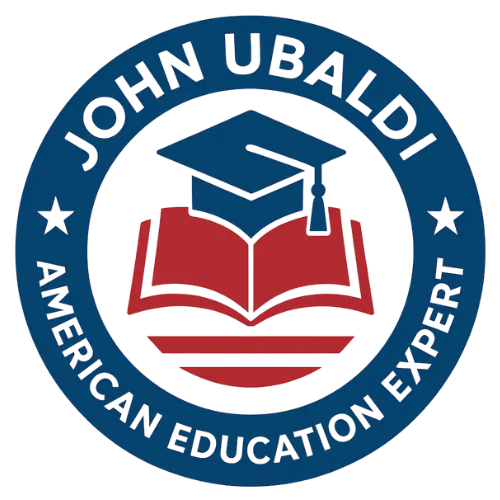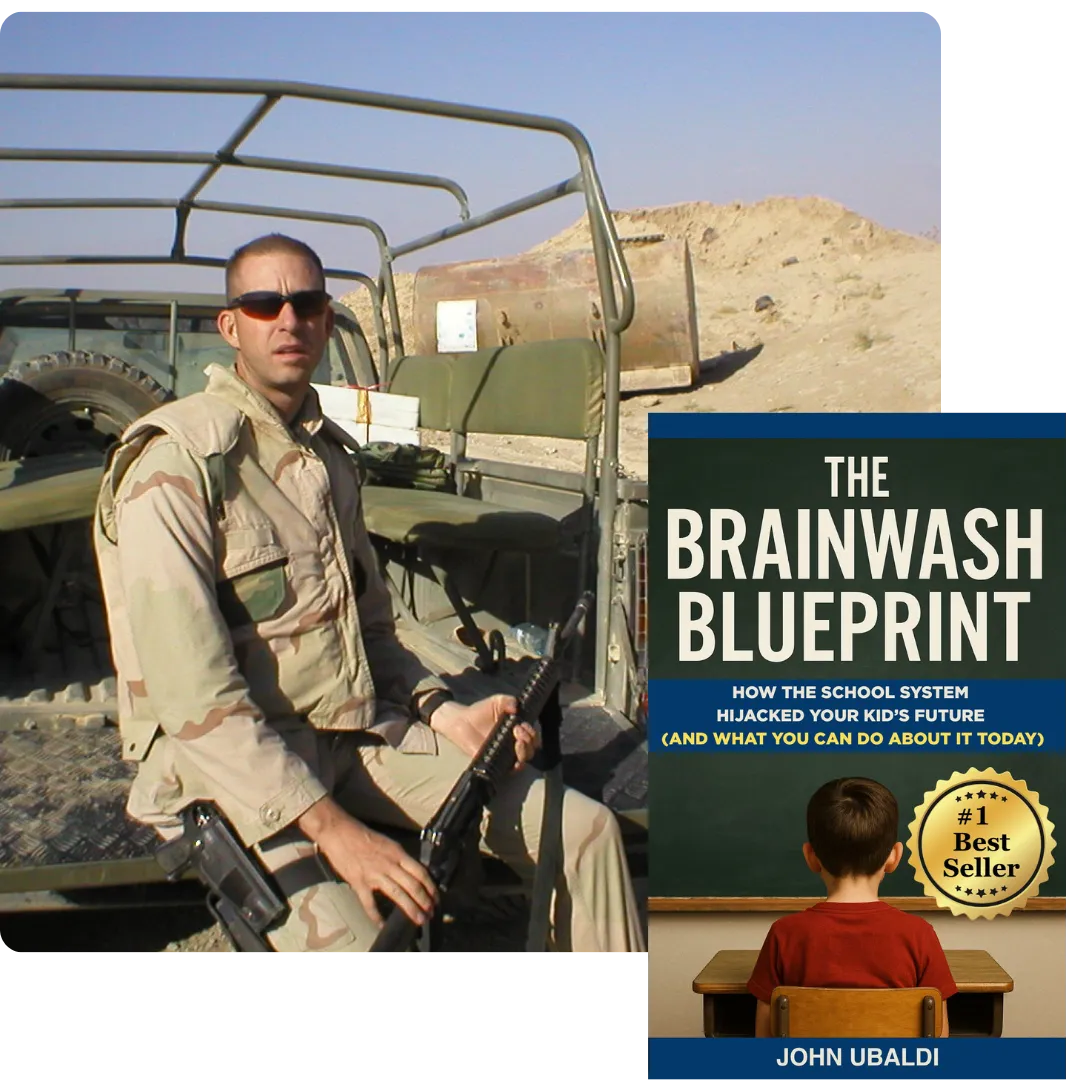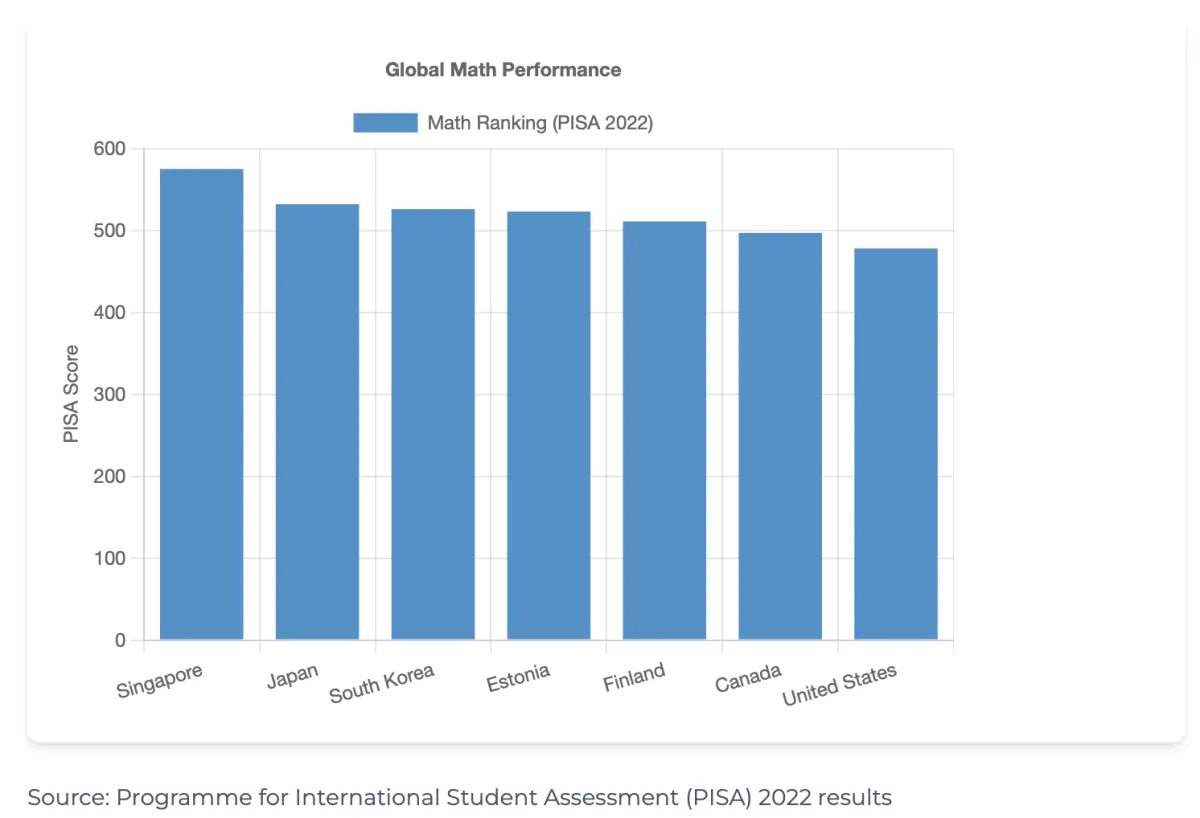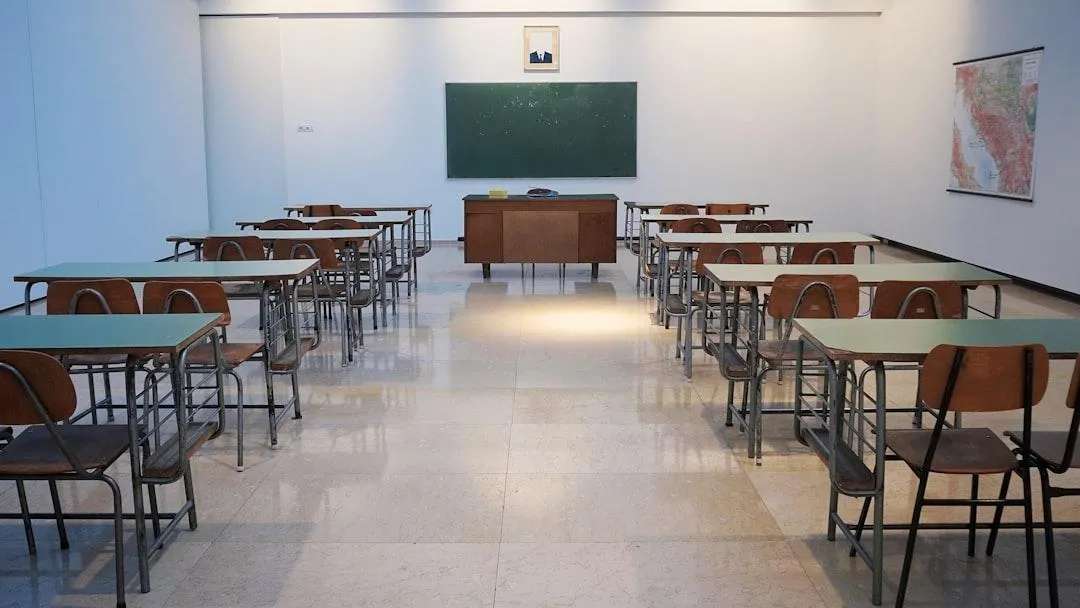John Ubaldi - American Education Expert
Transforming American
Education
John Ubaldi is dedicated to addressing the critical challenges facing American education and developing solutions for a better future.
"America's education system is facing unprecedented challenges. Addressing these issues is not just an educational imperative, but a national security concern."
- John Ubaldi

About John Ubaldi

Education & Background
Master's Degree in National Security Studies from American Military University
Bachelor's Degree in Government from California State University, Sacramento
30-year veteran of the United States Marine Corps
Three combat tours in Iraq and Afghanistan
#1 Best-selling Author
John Ubaldi is the president and founder of Ubaldi Reports, which provides credible, political content addressing domestic and global issues resulting in a well-informed and knowledgeable citizen that can take responsible action of their own choice.
As a 30-year retired veteran of the United States Marine Corps with three combat tours in Iraq and Afghanistan, John has become a foremost authority on Civil Affairs as it relates to Counterinsurgency and Irregular Warfare and is an author in various military journals.
John's expertise in education policy stems from his deep understanding of how educational systems impact national security and economic prosperity. He has dedicated significant portions of his career to analyzing the shortcomings of the American education system and proposing concrete solutions.
Works by John Ubaldi
Reviews on John Ubaldi's Work:
★★★★★ - "John Ubaldi's insightful breakdown of the great power competition is unmatched."- Rusty
Reestablishing America's Global Power offers a timely and incisive exploration of the United State's role in shaping the complex geopolitical terrain of today. Author John Ubaldi takes a contemporary analysis exploring the foundations, motivations, and consequences of American diplomacy in world affairs. One of the book's strengths is it's balanced treatment of America's military, economic, and cultural influence. While not shying away from critiques of American interventionism (e.g., Iraq and Afghanistan), Ubaldi acknowledges the stability and prosperity that the U.S. offers here and abroad. At the same time Ubaldi offers no sympathy when discussing the contradictions of global leadership which has led to a decline in how the U.S. is perceived. Political rivalry, internal polarization of Americans, and the declining global trust in U.S. leadership has given rise to Americas competitors. Ubaldi's inclusion of case studies, speeches, and policy documentation adds depth while maintaining a grassroots understanding of international relations theory and geopolitical analysis in world affairs. In conclusion, Reestablishing America's Global Power is an essential read for anyone seeking to understand the evolution of U.S. foreign policy and its implications for global order. As the world enters yet another new era of increasing national security uncertainty, this book provides a thoughtful framework for grappling with questions about American identity, responsibility, and power on the world stage.
★★★★★ - "Great read! Very informative!" - Michelle
As someone deeply passionate about education in America, I’m encouraged to see literature that presents the facts about the current state of our education system. John Ubaldi recognizes that there’s a serious problem that needs to be addressed and he doesn't shy away from it. I highly recommend this work.
★★★★★ - "Great read. Interesting prospectives." - Martin
Great read. Interesting prospectives.
★★★★★ - "Independence!" - Katherine
Ubaldi’s opinions make sense. How is the government spending so much money in education and our kids are failing in school. Government policies are creating dependent citizens who are dependent on the government to tell them what to think and what to do … not independent citizens with independent thoughts.
★★★★★ - "A Bold and Urgently Needed Wake-Up Call for America’s Future" - Lebelo
John Ubaldi delivers a compelling and unflinching examination of America’s declining global influence and the urgent need to reestablish a coherent national strategy. From the first page, Ubaldi challenges both Democratic and Republican administrations for failing to develop a comprehensive foreign policy in the post-Cold War era. He doesn’t shy away from tough truths—whether it’s America’s disastrous exit from Afghanistan, the rise of China, or the erosion of U.S. credibility on the world stage.
What I appreciated most is that this book isn’t written for one political party—it’s a call to all Americans to recognize the stakes. The writing is direct and passionate, with an emphasis on real-world consequences: economic instability, national debt, weakened alliances, and strategic missteps. Ubaldi connects domestic challenges like education and entitlement reform to broader international threats, showing how internal dysfunction leaves America vulnerable abroad.
This is not just a critique—it’s a push to begin a necessary national dialogue. Whether you agree with everything or not, Reestablishing America’s Global Power forces you to think critically about the role the U.S. should play in the 21st century.
A must-read for anyone serious about leadership, global affairs, or the future of the United States.
★★★★★ - "A great book to consider!!!" - Joe
This book is by far is Jonh Ubaldi’s best work!!! His knowledge on Education and Foreign Policy is vast and informative. I recommend this book to anyone who wants a deeper dive into our current state of government.
Achievements & Contributions
Bestselling Author
"The New Business Brigade: Veterans Dynamic Impact
on U.S. Business" & "The Brainwash Blueprint"
Media Commentator
Regular appearances on national and local news
programs
Podcast Host
Ubaldi Reports podcast focusing on education and
national security
Humanitarian Work
Organized $6 million in humanitarian aid to Iraq, Afghanistan, and other countries
Ubaldi Reports Podcast - Newest Episode:
Government is the Problem
Latest Podcast Episode:
Ubaldi Reports is a nonpartisan news and analysis site founded by Marine Corps veteran John Ubaldi. Focused on fact-based commentary, it covers U.S. policy, education, national security, and global affairs. Through articles, podcasts, and expert insight, the site empowers readers to think critically and cut through political spin.
Did You Know...?
The United States education system is facing unprecedented challenges that threaten the nation's future prosperity and security. John Ubaldi has been at the forefront of highlighting these issues and proposing actionable solutions.
30-Year Low
Educational test scores in math and reading have dropped to a thirty-year low according to the National Assessment of Educational Progress (NAEP).
33%
One-third of American eighth-graders are rated below "basic" for reading proficiency according to recent national assessments.
$900 Billion
Estimated loss in future earnings potential for students who experienced learning losses during recent educational disruptions.
Declining Performance
The 2024 National Assessment of Educational Progress (NAEP) revealed alarming trends:
Reading scores declined by 2 points for both 4th and 8th graders compared to 2022
Math scores showed a dramatic 7-point decline for 9-year-olds
Only 30% of fourth graders scored proficient or advanced in reading, down from 32% in 2022
The achievement gap between high and low-performing students continues to widen
"This decline in public education just didn't happen overnight but has been years in the making, but the Covid school lockdowns exacerbated an already disastrous educational achievement, especially harmful to black and Hispanic children."
-John Ubaldi
U.S. Global Education Rankings
The United States continues to lag behind many developed nations in key educational metrics:

Resources & Toolkits
The 10 Alarming Truths About U.S. Schools:
-Declining reading/math scores
-Influence of tax-exempt foundations
-Political bias in textbooks
-Lack of parent transparency
Education Crisis Infographic -
What They're NOT Telling You About Public Schools.
The Hidden Crisis in American Education.
While politicians claim progress, the data reveals a devastating decline in student achievement that threatens our nation's future.
Parental Survival Toolkit
What’s inside:
-Simple K–8 at-home reading & math boost sheet (15 min/day)
-Parent letter template to demand academic data from schools
-Links to independent curriculum and tutoring resources
-Email scripts to organize local education town halls
Find Schools in Your Area
Enter your ZIP code to find local school ratings and performance data:
Blog: The Education Edge


America’s Education Crisis: A National Emergency We’re Ignoring
The latest report from the National Assessment of Educational Progress (NAEP)
paints a grim picture of the state of public education in the United States. Once
considered a global leader in education, America is now watching its youth fall further
behind—not just by a few steps, but by miles.
According to the 2024 NAEP data:
- Only 21% of high school seniors are proficient in math.
- Just 33% are proficient in reading.
- Middle school students showed a significant decline in science literacy—a
critical metric for global competitiveness in the 21st century.
Perhaps most alarming: average reading scores are 10 points lower than they were
30 years ago. Instead of progressing, American students are regressing, especially
when compared with their international peers—particularly those in countries like China.
And yet, many of the nation’s elected leaders and public influencers are silent.
A Deafening Silence from Leaders Who Claim to Care
The silence is particularly stark from voices who frequently champion social justice,
racial equity, and the importance of public education. With over 70% of Black and
Hispanic children lacking proficiency in both math and reading, this should be a
crisis demanding urgent action.
Where is the outrage?
While Democratic leaders and activists voice support for public schools, many of them
quietly enroll their own children in elite private institutions:
-Governor Gavin Newsom kept California public schools closed while his own
children attended private in-person classes. His children now attend a
$60,000/year private school in Marin County, one of the wealthiest zip codes in
the U.S.
Barack Obama, once an advocate for urban education reform, has said little
about the catastrophic performance of Black students in his hometown of
Chicago, where more than 70% are not proficient in basic academic skills.
- Bill Clinton and Joe Biden also chose private education for their children while
public schools continued to decline under their leadership.
If public education is good enough for American children, shouldn’t it be good enough
for their children too?
Money Is't the Problem—Accountability Is
Critics often argue that we just need to “invest more.” But the numbers tell a different
story:
- The U.S. spends over $880 billion annually on public education.
-During the pandemic, an additional $300+ billion in federal funding was funneled
to schools.
Despite this enormous investment, outcomes have worsened. Where did the money
go? Where is the oversight? And who is being held accountable?
The Unspoken Power of the Teachers’ Unions One of the largest obstacles to educational reform is the political power of the teachers’ unions, particularly the American Federation of Teachers (AFT). Union
leadership was deeply involved in influencing public health policy during the pandemic, including efforts to keep schools closed longer than necessary.
These unions donate almost exclusively to Democratic candidates, creating a
powerful incentive for elected officials to protect the status quo rather than advocate
for meaningful reform.
Add to that a bloated educational bureaucracy that resists innovation and clings to
outdated ideologies, and you have a system that rewards mediocrity while punishing
excellence.
In the name of "equity," standards are being lowered across the country—graduating
students who are unprepared for college, the workforce, or the military. Businesses are
forced to spend billions on remedial education, and the U.S. military increasingly rejects
applicants who fail to meet basic academic requirements.
This Is a National Security Issue
This isn't just an education issue. It's a national security threat. A poorly educated
generation means a weaker economy, a vulnerable military, and a population more
easily misled by disinformation and political manipulation.
And the most tragic part? It appears no one in power cares enough to act.
Contact John Ubaldi
Whether you're interested in having John speak at your event, appear on your media program, or discuss education policy, he would be happy to connect with you.
Bestselling Author
Email: [email protected]
Website: www.ubaldireports.com
Podcast: Ubaldi Reports
Connect on Social Media:



Facebook
Instagram
TikTok